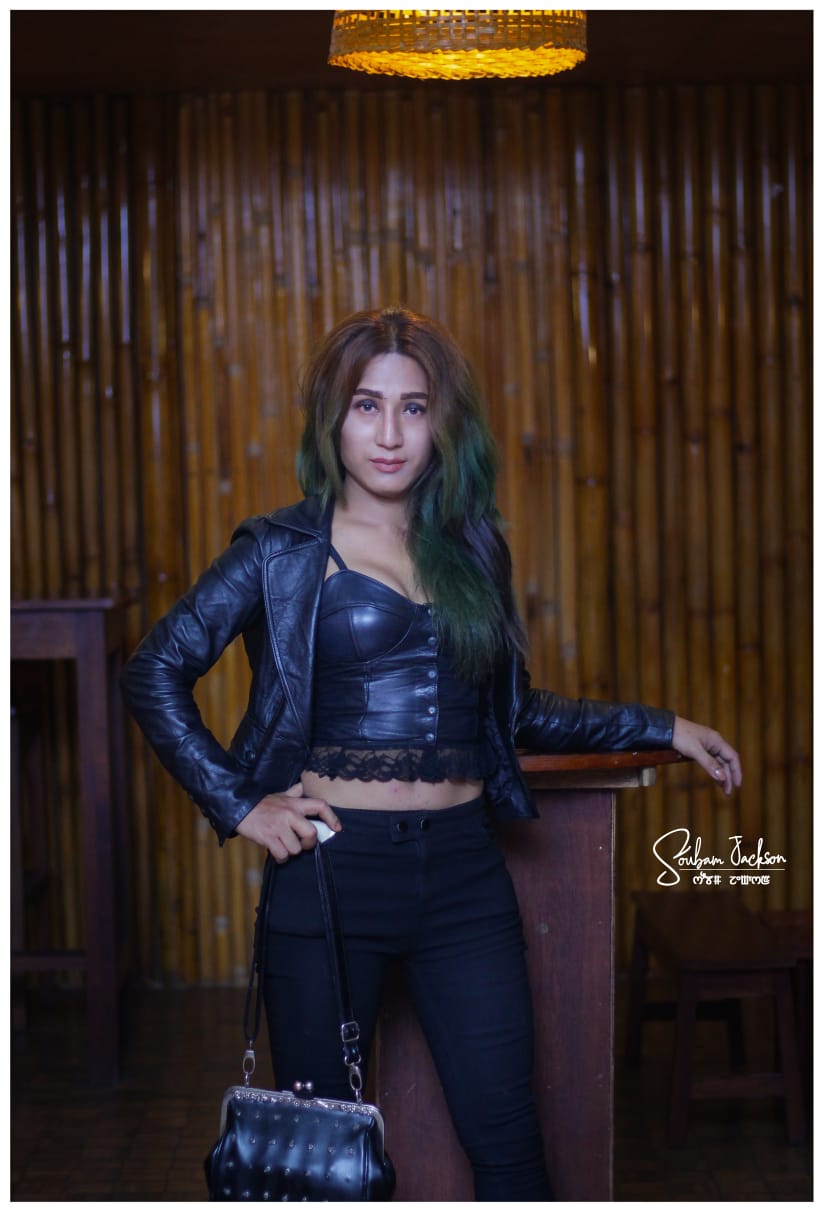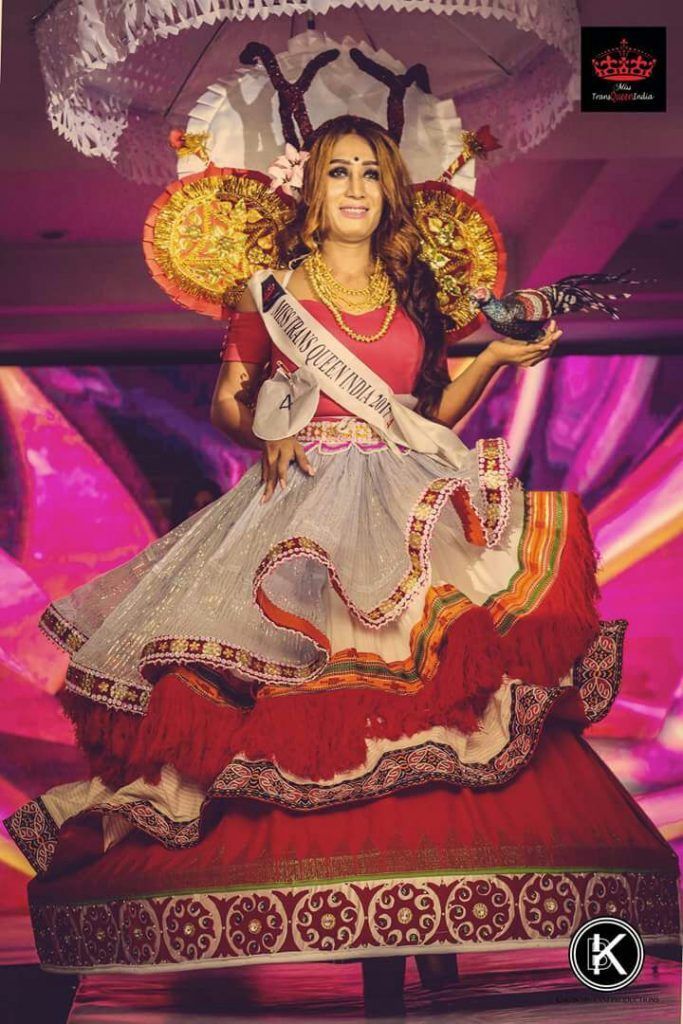Eliza Ngangom is a transgender woman from Manipur, a small state in the North Eastern part of India. After a long and successful beauty pageant career, she now runs her own beauty parlour. Apart from this, she also professionally grooms beauty pageant aspirants and is a well known make-up artist in the state. While same sex relationships are no longer criminalized in India, many in the LGBTQIA still face societal challenges. In Manipur however, there has always been an acceptance of the transgender community. I wanted to dig deeper. So earlier this month, I spoke to Eliza and the challenges she’s had to face.
Jessica: Hello Eliza, please tell us about yourself. When did you know you were transgender?
Eliza: I am a 30 year old transgender model from Manipur. When I was a kid, I used to play only with girls. I would want to wear girls’ clothing and I thought that I was a girl but when I was around 12 or 13 years old, I realised that I was not a girl.
Jessica: Could you tell us your coming out story and the reactions you received? How difficult was the decision to transition?
Eliza: It was a difficult transition. I have always acted like a girl but nobody accepted me back then. My parents and family members could not understand me and at that time. I felt a sense of seclusion. They would continuously scold me. Shortly after, I left home and lived with other transgender people. Things have changed now however. My family and friends have accepted me as I am.

Jessica: You are a known personality in the transgender community, what are/were the biggest difficulties you’ve had to face in Manipur?
Eliza: There is nothing that could be considered as difficult in Manipur as our people are quite accepting. Sometimes though there are people who call us names such as “Homo.” I have learnt to just ignore such comments. Manipur culture is quite open to transgender people and although we can be as we are, when it comes to marriage, I don’t think they are as accepting. I think that would be difficult for people to come to terms with marriage.
Jessica: Tell us about Sumang Leela. What do you have to say about Manipur’s cultural acceptance of transgender people?
Eliza: Sumang Leela is an art form in which a play is played on stage entirely by a male cast. There is no women participation. Female characters are also played my men. Now-a-days, transgender people play a very important part in Sumang Leela. Manipur culture is very accepting of transgender people and this we see as trans-people play leading roles in the film industry here.
Jessica: Tell us about the trans-beauty pageants in Manipur? How has society responded to the pageants?
Eliza: There are various transgender pageants that take place in Manipur. I have taken part in many of them. Our society responds positively to the trans-beauty pageants. They are very popular.

Jessica: Tell us about the beauty pageants you’ve competed in? What is the atmosphere like in these pageants?
Eliza: I’ve competed in many beauty pageants such as the Grand Indian Film Production Beauty Contest in New Delhi. I also represented Manipur in the Miss Trans Queen India 2017. The atmosphere is very nice. We are all very supportive of each other.
Jessica: Do you think transgender women should be able to compete in all women beauty pageants and not just transgender ones?
Eliza: Yes, I think transgender women should be able to compete in women beauty pageants. I had competed in an all gender pageant in New Delhi where all but two of the contestants were female and I won the pageant. This was in 2016.
Jessica: How progressive is India in terms of LGBTQIA rights? How did you feel hearing the recent judgement to decriminalise Section 377 of the Indian Penal Code?
Eliza: I don’t think India is as progressive in terms of LGBTQIA rights but things are moving forward. With the recent Supreme Court judgement, I feel very happy to hear it.
Jessica: What can the government do to facilitate social inclusion and acceptance for the third gender?
Eliza: They have given us the third gender category but they should also give us various rights and quotas. Especially in terms of health and education. I think this would help with social inclusion. It is difficult for schools to accept transgender people. Families eventually come to terms but schools are different.
Jessica: How are you able to work through the discrimination in order to create your success?
Eliza: I always take things in a positive way. So if people scold me for being transgender, I don’t mind. I just do what I think is the right thing. I think I will get my due respect. If I get negative comments, I try to look at the positive side and keep working hard.
Jessica: People can be quite insensitive to gender issues. Do you think people fear what they don’t understand or is there more to it?
Eliza: Yes, people can be very insensitive to gender issues. In reality, it is not that they can’t understand the issues but that they choose to ignore them.

Jessica: Do you think there is stereotyping by the media and society when it comes to transgender people?
Eliza: As far as I have seen, no, I do not think so.
Jessica: Safety has been an issue for transgender people. Reported violence of physical and verbal abuse is rampant towards the third gender throughout the country. What do you have to say on the issue of safety?
Eliza: Yes, safety is an issue. I would like the government to open a helpline specifically for transgender people. We would greatly benefit from this as there are many instances of violence against transgender people.
Jessica: Do you have a message for transgender people who are living closeted lives?
Eliza: Yes, I do have a message for transgender people. Be yourself! We are born this way. Focus on getting a good education. You should be a role model and education is key. Do not waste time but instead focus and concentrate on what you are doing and achieve your goals.

